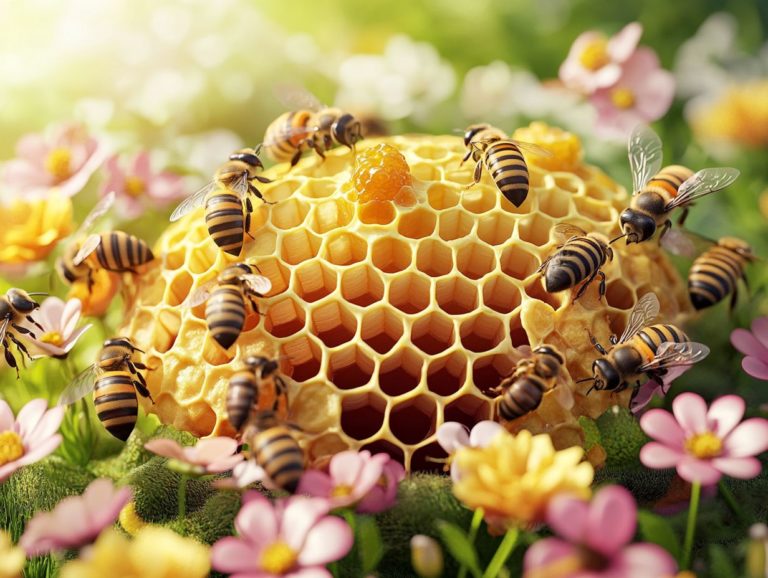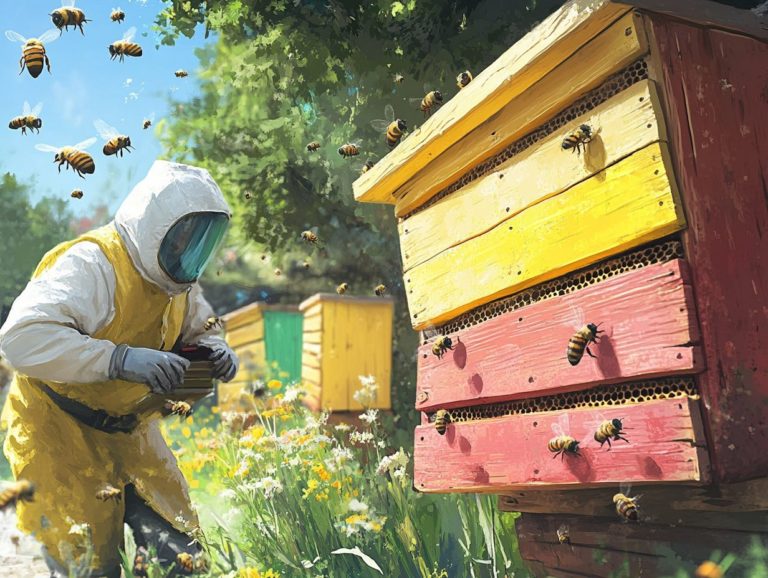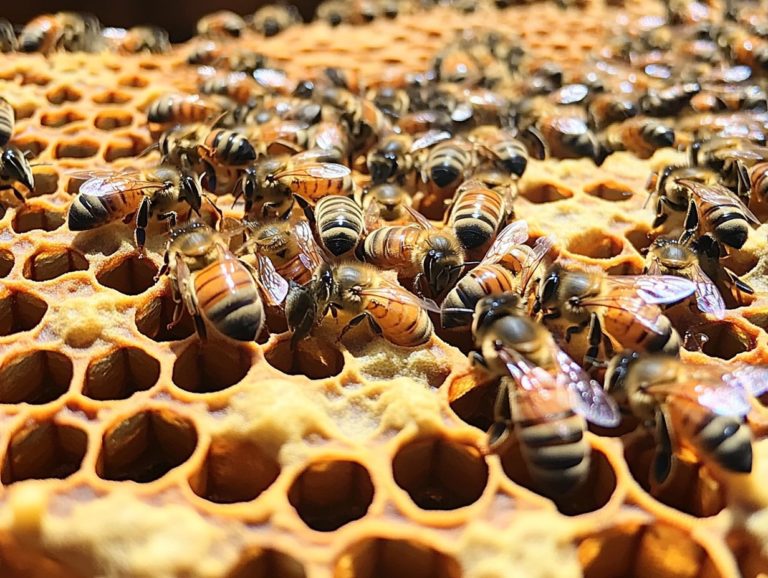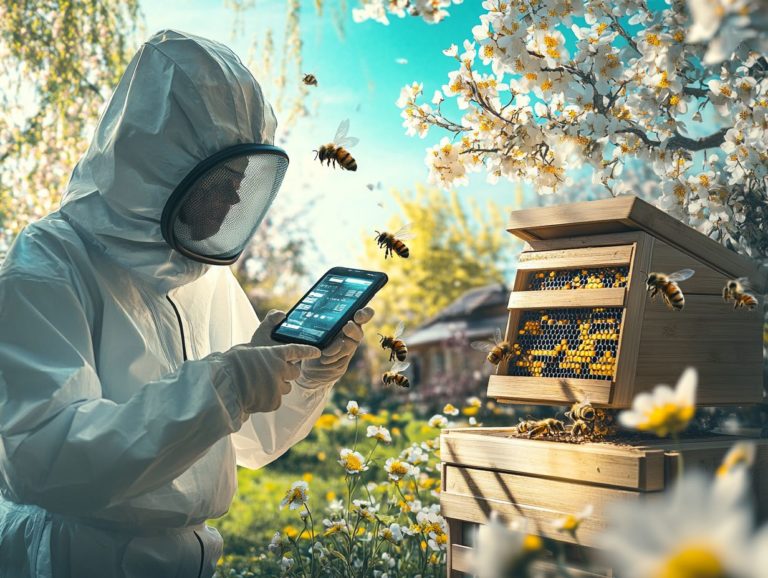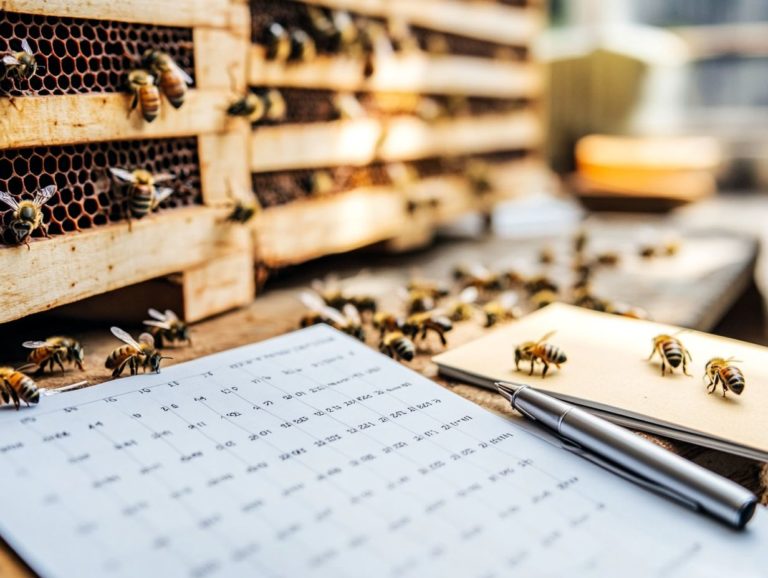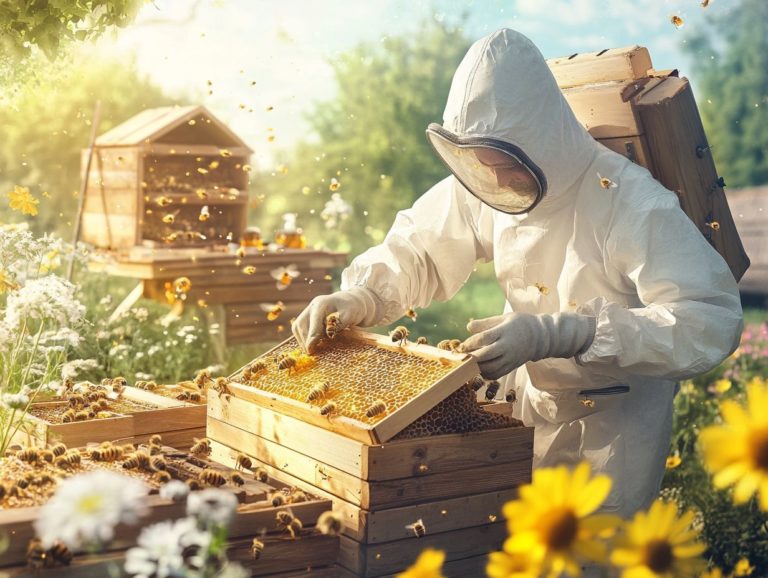The Benefits of Regular Hive Maintenance
Hive maintenance is an essential practice for you as a beekeeper. It plays a crucial role in ensuring the health and productivity of both your bees and the bee hive.
By engaging in regular upkeep, you foster a thriving bee colony. This not only enhances your beekeeping experience but also boosts your honey production significantly.
This article delves into the importance of hive maintenance and the benefits it brings to both you and your bees. It offers practical advice on how to maintain your hive effectively while integrating sound beekeeping practices.
From the essential tools you need to common issues and their solutions, you’ll discover how dedicated hive care, including routine inspections, can pave the way for a successful beekeeping journey.
Contents
- Key Takeaways:
- What is Hive Maintenance?
- Why is Regular Hive Maintenance Important?
- How Often Should Hive Maintenance be Performed?
- What are Common Issues Found during Hive Maintenance?
- What are the Risks of Neglecting Hive Maintenance?
- What are Some Tips for Efficient Hive Maintenance?
- Frequently Asked Questions
Key Takeaways:
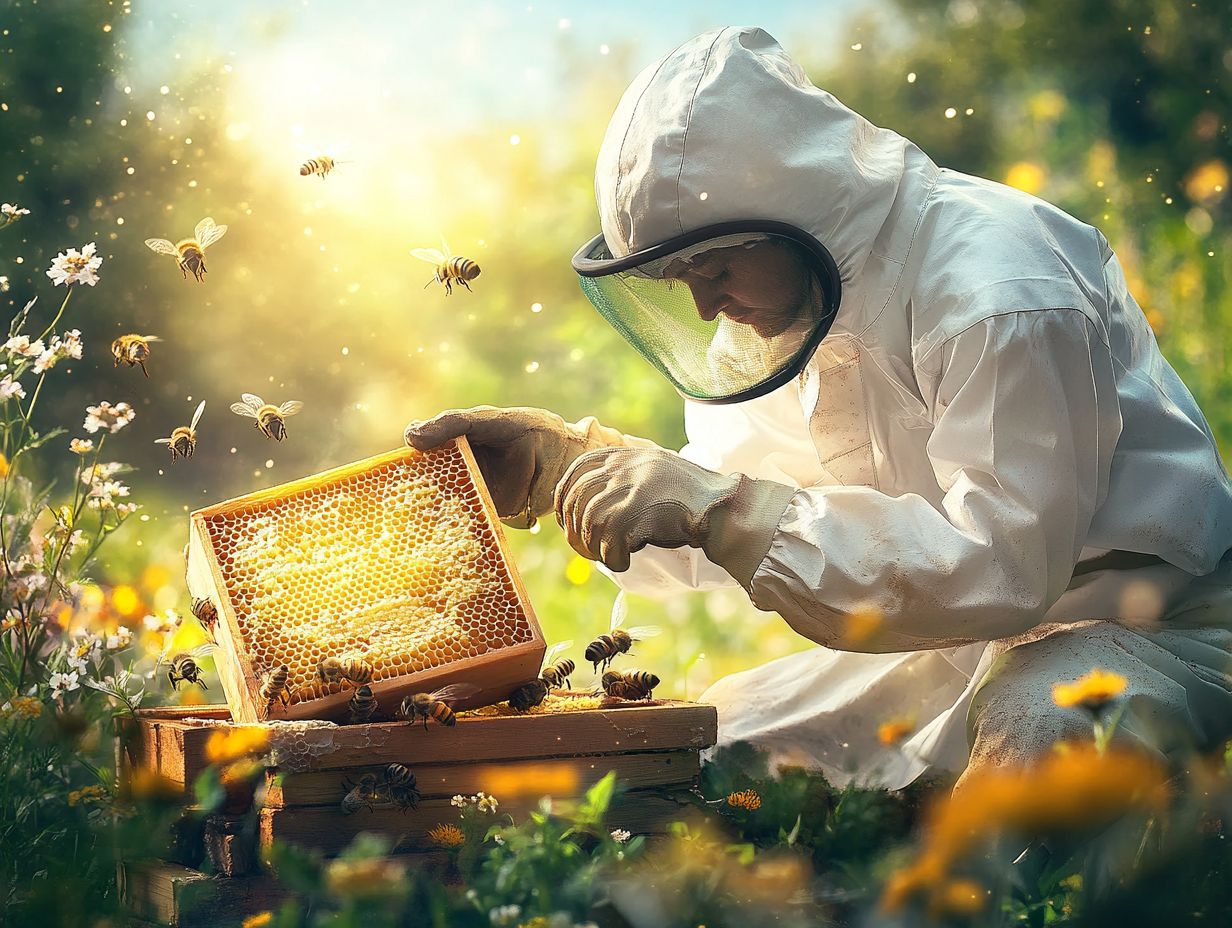
- Regular hive maintenance is crucial for both beekeepers and bees, ensuring hive stability.
- Proper hive maintenance can prevent common issues and ensure the health of the bee colony, contributing to healthy colonies.
- Neglecting hive maintenance can have negative consequences for both the beekeeper and the bee colony, including increased signs of stress.
What is Hive Maintenance?
Hive maintenance stands as a cornerstone of successful beekeeping. It is vital for keeping your colonies healthy and productive throughout the season.
It requires you to engage in regular checks and meticulous monitoring of hive conditions. You should focus on the overall health of your bee populations.
This means observing the bees, inspecting frames, and checking for any signs of disease. Varroa mites are harmful parasites that can weaken bee colonies. Small hive beetles can also pose a significant threat. By conducting these inspections regularly, you can spot signs of stress early, manage your hives with precision, and contribute to environmental sustainability all while nurturing a vibrant beekeeping community.
Why is Regular Hive Maintenance Important?
Engaging in regular hive maintenance is crucial for maintaining the stability and productivity of your bee colonies. These colonies play a vital role in honey production and environmental pollination.
This often involves the use of preventive measures to mitigate risks. This practice enables you to closely observe bee behavior, monitor food stores, and identify potential threats.
By conducting consistent inspections, you not only help reduce stress on the colony but also ensure that your bees remain healthy and thrive in their environment.
What are the Benefits of Regular Hive Maintenance for Beekeepers?
Regular hive maintenance unlocks exciting benefits that can transform your beekeeping experience. By conducting routine inspections, you can spot signs of stress in your colonies, check for diseases, and implement preventive measures to ensure their health.
This proactive approach deepens your understanding of bee behavior. It also fosters a sense of community among fellow beekeepers who share valuable insights and best practices.
Sticking to a consistent hive management schedule will significantly boost your honey yields. This allows you to address any issues that may impact your colony s productivity without delay.
Employing techniques like swarm prevention and proper seasonal feeding is crucial for nurturing a robust beehive that thrives all year round.
Engaging regularly with local beekeeping associations encourages knowledge sharing and collaboration. This network allows you to learn from the experiences of others, ultimately leading to improved practices.
By embracing these community-driven initiatives, you enhance the health of your hives while cultivating a supportive network that enriches your beekeeping journey.
Start your hive maintenance today and watch your bees thrive like never before!
What are the Benefits of Regular Hive Maintenance for Bees?
Regular hive maintenance offers tremendous benefits to your bees by creating the healthy conditions necessary for their growth, productivity, and overall well-being.
By conducting routine inspections, you can monitor brood patterns the arrangement of eggs and larvae in the hive manage hive space efficiently, and check food stores to ensure that your bees have all the resources they need to thrive.
This careful attention to hive conditions helps alleviate stressors, allowing your colonies to flourish and fulfill their vital role in environmental sustainability.
Conducting regular checks for disease and pests is essential in preventing outbreaks that could devastate your colony. Monitoring for Varroa mites and other common threats not only protects your bees but also safeguards the overall health of the hive.
It s crucial to ensure consistent ventilation and appropriate humidity levels within the hive. These proactive measures create optimal living conditions, directly influencing your bees’ behavior, leading to increased foraging efficiency and reduced stress levels.
As a result, well-maintained colonies are far better equipped to produce honey, pollinate crops, and contribute to ecological balance.
How Often Should Hive Maintenance be Performed?
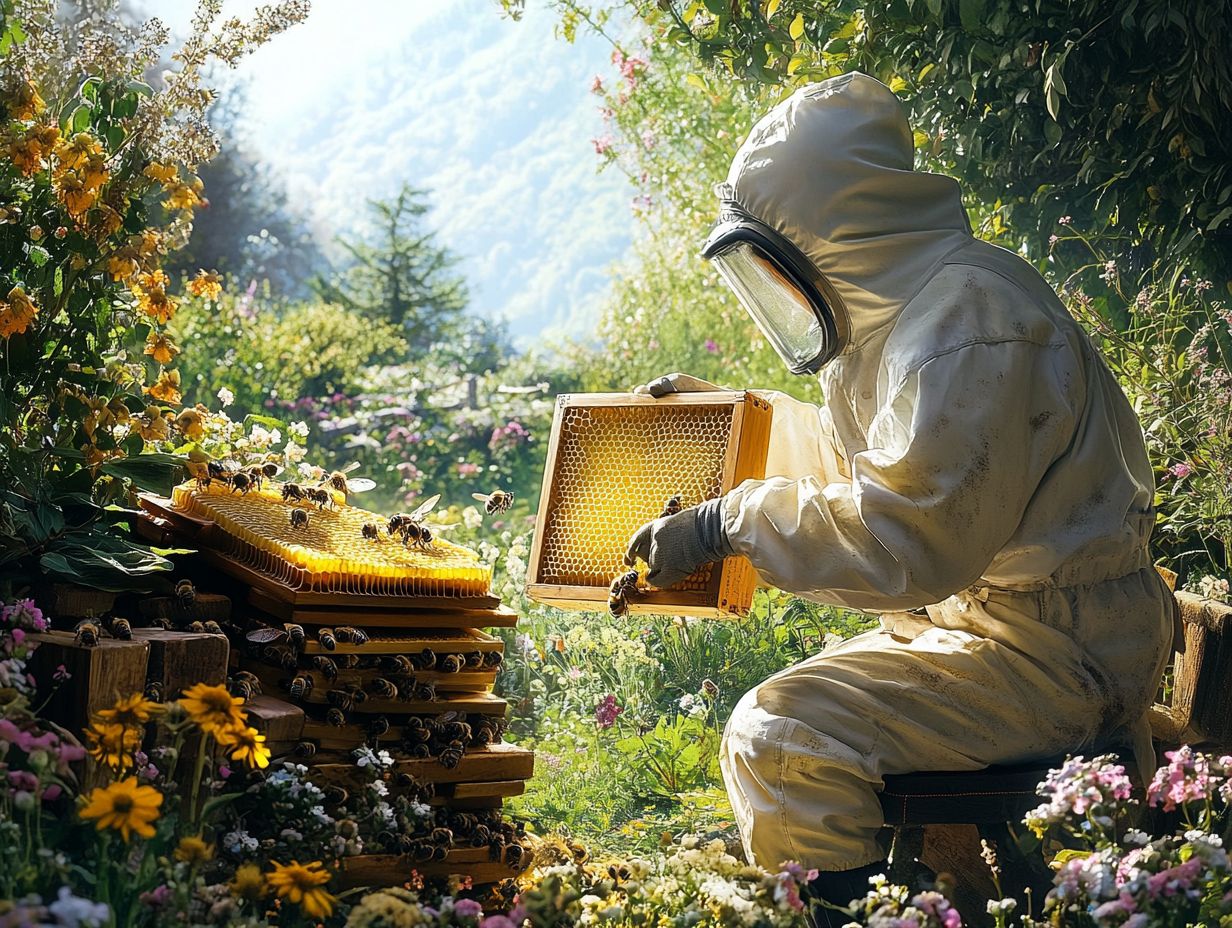
The frequency of hive maintenance should be strategically aligned with the seasonal calendar. Typically, this ramps up during the active season when bees are at their most productive, making inspections critical.
You should aim to conduct routine inspections at least every couple of weeks. This ensures the overall health of your colonies and allows you to keep an eye out for any signs of stress or disease.
This regular practice lets you effectively manage your hives and support thriving bee populations throughout the year by following a seasonal schedule.
What Tasks are Involved in Hive Maintenance?
Hive maintenance encompasses a range of essential tasks that ensure the health and productivity of your bee colonies. This includes routine inspections and careful observation of the hive conditions.
During these inspections, you ll want to examine the frames for brood patterns, check for diseases or pests, and capture swarms when necessary.
As a beekeeper, it s imperative to assess honey stores regularly. This guarantees that your bees have sufficient resources, especially as the seasons shift most notably as winter approaches or during periods of nectar scarcity.
Keeping vigilant for signs of pests like Varroa mites or foulbrood is key. Prompt action can save your colonies from significant losses.
You might also consider adjusting hive placement to optimize sun exposure or wind protection. This adjustment can greatly enhance colony health.
Documenting changes during your inspections will allow you to track your colonies’ progress and spot ongoing issues. This fosters a proactive approach to hive management while promoting sustainable beekeeping practices.
What Tools are Needed for Hive Maintenance?
To perform effective hive maintenance, you ll need a selection of specialized tools designed to make inspections easier and enhance your hive management.
Having the right equipment enables you to approach your work with confidence. It significantly impacts the overall health of your bees and their hive.
For example, a quality hive tool, typically featuring a flat edge for scraping and a hook for lifting, simplifies frame manipulation and allows for a thorough examination of the colony.
Using a bee smoker is essential; it releases calming smoke that soothes the bees, making your inspections smoother and safer.
Let s not underestimate the importance of protective gear like veils and gloves. These are your best defense against stings, allowing you to maintain control while managing your hives effectively.
Using the right tools is essential for thriving bees and a successful hive. Don’t underestimate their impact!
What are Common Issues Found during Hive Maintenance?
During routine hive maintenance, you may encounter issues threatening your colonies’ health. Common problems include diseases like Varroa mites and infestations from small hive beetles.
Recognizing these challenges early is essential for preserving the vitality of your colonies and ensuring the sustainability of your beekeeping endeavors. Regular inspections allow you to evaluate hive conditions and identify signs of stress that may arise from these concerns, ensuring effective hive management.
How Can These Issues be Prevented or Resolved?
To prevent and resolve issues, take a proactive approach to hive management. Regular inspections help monitor bee behavior and address signs of stress or disease quickly, using treatment methods when necessary to protect your colonies.
By integrating best practices into your routine, you can significantly reduce the chances of encountering serious issues within your hives. Stay vigilant! Subtle changes in bee behavior, like reduced foraging or increased aggression, may signal pests or diseases.
You should routinely observe the hive’s entrance for unusual activity and check for signs of Varroa mites or American foulbrood. Implementing treatment methods such as integrated pest management (IPM), which combines different strategies, natural remedies, and timely medication, can effectively mitigate these threats.
Maintaining adequate hive ventilation and ensuring proper nutrition for your bees can enhance their resilience against common health challenges. By conducting regular hive inspections and integrating effective beekeeping techniques, you can achieve a thriving colony that not only produces honey but also plays a vital role in pollinating local flora.
What are the Risks of Neglecting Hive Maintenance?
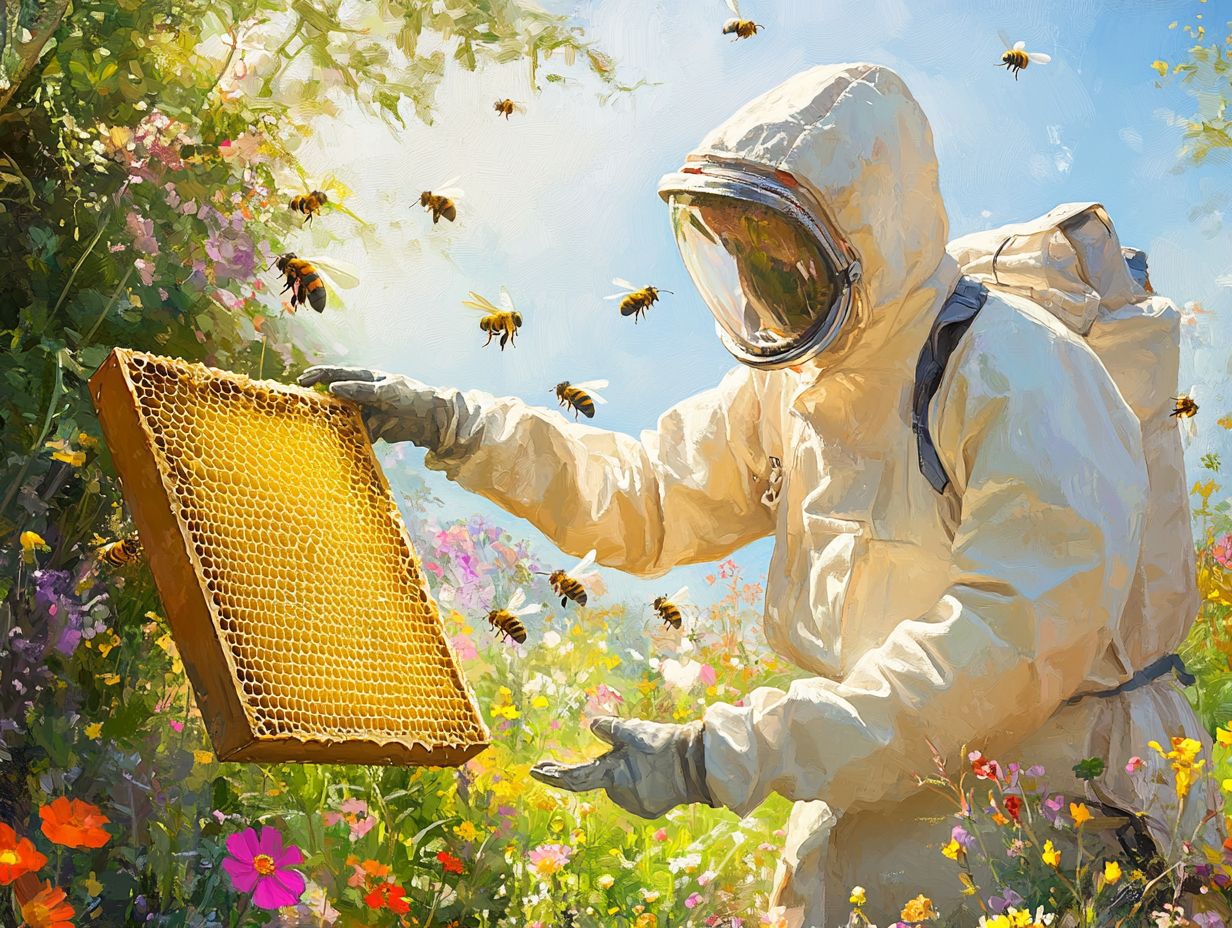
Neglecting hive maintenance not only jeopardizes colony health but also curtails pollen collection and impacts environmental sustainability.
Neglecting hive maintenance risks your bee colonies’ health and your beekeeping effectiveness. It can lead to detrimental impacts on colony vitality and productivity. An absence of routine inspections hinders your ability to observe behavior and catch early signs of issues.
Without routine inspections, you may overlook critical changes in bee behavior or hive conditions, potentially resulting in disease outbreaks, decreased honey production, and even the catastrophic collapse of your colonies. It s crucial to act now!
Prioritize hive maintenance by inspecting frames and checking for diseases. Doing so ensures the sustainability and success of your beekeeping endeavors.
How Can Neglecting Hive Maintenance Affect the Bee Colony?
Neglecting hive maintenance can lead to significant consequences for your bee colonies, often manifesting as visible signs of stress that indicate declining health and productivity. Regular hive observation is crucial to catch these early warning signs.
Without regular inspections, you might miss critical issues such as disease or inadequate food reserves, which can ultimately weaken your colonies and reduce honey production. This is why perform inspections regularly to maintain colony health. This oversight not only jeopardizes the immediate welfare of your bees but also threatens the long-term viability of your hive. Regular hive inspections are key to effective management.
An unchecked hive can easily become a breeding ground for pathogens like Varroa mites and Nosema, as well as small hive beetles, thriving in an environment devoid of routine monitoring and intervention. As these diseases spread unchecked, the colony’s ability to forage for nectar and collect pollen diminishes, resulting in a notable decrease in honey yields.
This ripple effect highlights the necessity of proactive colony management strategies, such as regular mite checks, observing behavior, and ensuring sufficient food stores, which are crucial for maintaining vibrant bee populations.
By adopting a careful approach to hive care, you can not only boost honey production but also bolster the overall health and resilience of your colonies. This also includes participating in beekeeping education and community initiatives like Bees & Refugees.
How Can Neglecting Hive Maintenance Affect the Beekeeper?
Neglecting hive maintenance has consequences that ripple far beyond the colonies, directly impacting your success and reputation within the beekeeping community. Poor maintenance can also reduce your ability to capture swarms.
When your hives aren t well-maintained, you may experience decreased honey production and financial losses, alongside diminished capabilities to capture swarms or manage your colonies effectively. This could also result in missed opportunities for community interaction and educational beekeeping insights.
The negative consequences of neglect might even discourage new beekeepers from pursuing this rewarding practice, ultimately hindering community growth and the sharing of valuable knowledge through programs like EAS Master Beekeeper.
If you overlook proper hive upkeep, you could see a reduction in pollination effectiveness, which can have cascading effects on local agriculture and environmental sustainability.
This, in turn, may lessen the demand for honey and hive products, putting a strain on the economic viability of beekeeping as a business. Proper apiary management and preventive measures can mitigate these risks.
Without consistent attention to hive health, issues like disease and pests can escalate, making management increasingly challenging. Regular hive inspections are essential for identifying and addressing these early on.
Such dilemmas not only jeopardize your individual operations but also threaten the collective progress and resilience of beekeeping communities, highlighting the imperative of regular maintenance practices and hive observation.
What are Some Tips for Efficient Hive Maintenance?
Efficient hive maintenance demands a blend of best practices and strategic techniques that simplify the inspection process and elevate overall hive management. Implementing a seasonal schedule for routine inspections can ensure successful inspections.
You should establish a regular schedule for routine inspections, honing in on key indicators of hive health, such as brood patterns (the arrangement of bee larvae), queen cells (special cells where new queen bees develop), and food stores. This helps in maintaining healthy colonies.
Using effective beekeeping methods helps maintain optimal hive conditions and foster robust bee populations, crucial for colony management.
Frequently Asked Questions
Join the beekeeping community today and ensure your hives thrive! Act now to protect your colonies and boost honey production.
What are the benefits of regular hive maintenance?
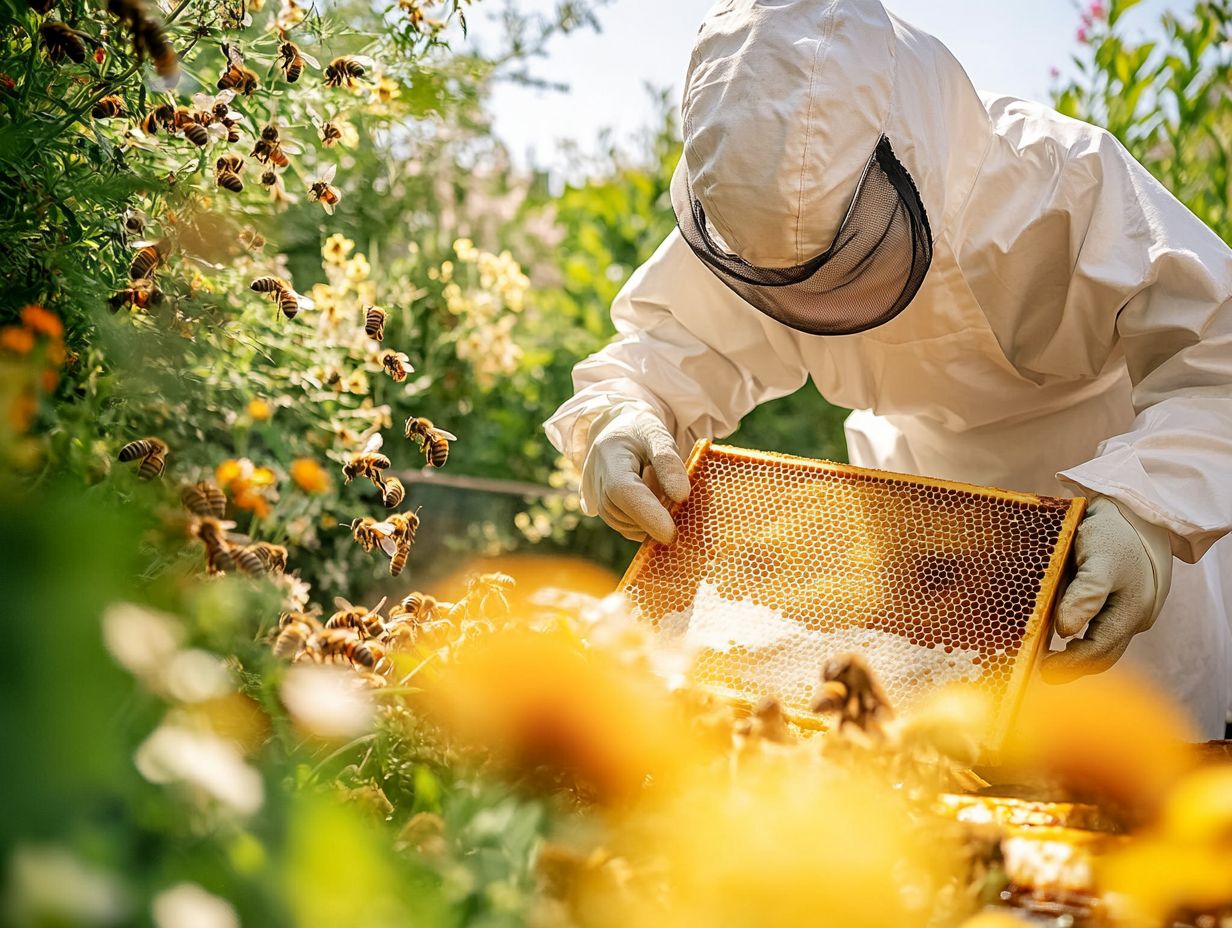
Regular hive maintenance keeps your hive healthy and productive. This ensures a steady supply of honey and supports a strong bee population.
It also enhances mental health and offers therapeutic benefits for beekeepers.
How often should I perform hive maintenance?
Following a beekeeping routine is essential for effective colony management.
Keep your hive buzzing with life by performing maintenance every 2-3 weeks during the active bee season. In the off-season, check at least once a month.
What tasks are included in hive maintenance?
Key tasks include hive inspections and checking the health of the bees. Ensure there are adequate food stores and clean environments.
Regular maintenance also involves checking for signs of disease and ensuring the food and water supply is sufficient.
How does maintenance benefit the bees?
Regular maintenance keeps bees healthy and free from diseases and pests. This allows them to thrive and produce honey more efficiently.
It also contributes to better hive stability and overall colony health.
Can hive maintenance increase honey production?
Yes! Regular hive maintenance increases honey production by providing a clean and healthy environment for bees. Ensure they have access to necessary resources and monitor the hive entrance regularly.
What happens if I neglect hive maintenance?
Neglecting hive maintenance can decrease honey production and weaken bee populations. This increases the risk of disease and pest infestations, including issues with beeswax comb.
Don’t wait! Regular hive maintenance is crucial to protecting your bees and maximizing honey production.

